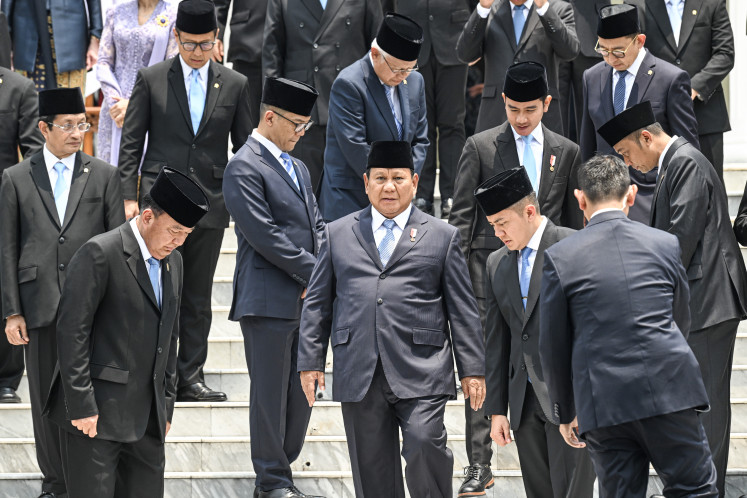Popular Reads
Top Results
Can't find what you're looking for?
View all search resultsPopular Reads
Top Results
Can't find what you're looking for?
View all search resultsSocial security for all workers
Despite a negotiation frenzy as contribution rates were determined for the pension program for salaried and non-salaried workers, the Workersâ Social Security Agency, (BPJS Ketenagakerjaan), was finally launched on July 1 as scheduled
Change text size
Gift Premium Articles
to Anyone
D
espite a negotiation frenzy as contribution rates were determined for the pension program for salaried and non-salaried workers, the Workers' Social Security Agency, (BPJS Ketenagakerjaan), was finally launched on July 1 as scheduled.
This program is to provide universal social security for Indonesian workers consisting of a pension scheme, old-age benefits, workplace injury benefits and death benefits.
This means that pension benefits will no longer only be enjoyed by retired civil servants, military and police personnel and the employees of major companies, but by all workers, salaried and non-salaried.
Of most importance is that the government and the private sector have agreed to set the contribution rate at three percent of the payroll, of which two percentage points are put up by employers and the other one percentage point by the employees. The rate will be reviewed every year with the objective of gradually raising it to 8 percent.
The universal healthcare and universal worker's social security, provided by the Healthcare Social Security Agency, (BPJS Kesehatan) ,and BPJS Ketenagakerjaan respectively, are based on Law No. 40/2004, also known as the National Social Security Reform Act (SJSN).
Based on the principle of social insurance, or compulsory savings, the whole worker social security package aims to maintain decent basic living standards when participants encounter income loss or decrease resulting from workplace injuries, old age, retirement or death.
Law No. 24/2011 regarding social security agencies (BPJS), stipulated that BPJS Kesehatan should implement the health-care insurance program from Jan. 1, 2014, and BPJS Ketenagakerjaan ' the merger of previous state-owned insurance providers such as Jamsostek, Asabri and Taspen ' should implement the workers' social security program as of July 1 this year.
But there are several pressing challenges ahead in fully implementing this national social security system (NSSS).
Firstly, provisions regarding the position of informal workers in the pension program remain unclear. under Chapter 1 Article 1 of the NSSS Law, social security is defined as 'one form of social protection to ensure that all people have their basic living needs fulfilled'.
The scheme is intended for 'all people', regardless of the nature of their employment, be it in the informal or formal economy.
However, the cost-sharing formula for contributions to the scheme remain weighted toward formal workers in all four forms of benefit, especially in the pension program, which does not cover informal workers or non-salaried workers.
For the time being, for formal, salaried workers, the employers' contribution for workplace injury benefits is 0.24 to 1.74 percent of the employee's monthly salary.
This range is based on contributions in the business category only, where old-age benefits (JHT) comprise 3.7 percent (of salary) employer contribution and 2 percent worker contribution. Employers must also contributes 0.3 percent of each workers' salary toward death benefits.
For informal workers, contributions to workers' social security ' fully paid by participants themselves ' are 1 percent for workplace accident benefits, (minimum) 2 percent for old-age benefits and 0.3 percent for death benefits.
The unclear contributions arrangement for informal workers might hamper the universality of social security as a full package and this issue must be addressed soon by BPJS. In a country where almost 80 percent of the economy is informal, a comprehensive social security scheme must include informal workers.
Secondly, the various pension or retirement schemes already existing should be harmonized. The pension scheme does not stand alone as it has close links with employment, industrial relations, economics, health and other demographic policies.
As such, a number of reviews are needed ' on Pension Law No 11/1992, financial institution pension funds (DPLK), employers' pension funds (DPPK) etc. ' to support the new pension program's implementation.
Thirdly, BPJS institutional and personnel transformation is needed to move it toward being a financially sustainable institution fulfilling its social mission. The shift from being a profit to a non-profit institution demands fundamental transformation of human resources and ways of working. Otherwise, profit seeking attitude will dominate the way it works.
The paradigm must be set such that the return it yields from the investment it receives ' which increased almost 225 percent at the end of 2014 ' should be used to maintain its financial sustainability and the welfare of workers, and not to enrich the institution.
Barr (2008) points out that social security influences, and is influenced by, economic growth, wealth distribution and poverty reduction in a country. Thabrany (in Rys, 2011) reminds us that the ultimate goal of social security is to achieve welfare equity across different economic groups, which in the long run, will reduce inequality.
Therefore, it is important for the government to ensure that workers from all income groups enjoy the security that these new schemes provide.
______________________________
Ah Maftuchan and Victoria Fanggidae are social policy researchers at Perkumpulan Prakarsa (Centre of Welfare Studies), Jakarta.










